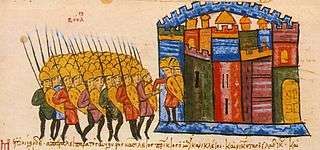914
This article is about the year 914. For the car, see Porsche 914.
| Millennium: | 1st millennium |
|---|---|
| Centuries: | 9th century · 10th century · 11th century |
| Decades: | 880s · 890s · 900s · 910s · 920s · 930s · 940s |
| Years: | 911 · 912 · 913 · 914 · 915 · 916 · 917 |
| 914 by topic | |
| Politics | |
| State leaders – Sovereign states | |
| Birth and death categories | |
| Births – Deaths | |
| Establishment and disestablishment categories | |
| Establishments – Disestablishments | |
| Gregorian calendar | 914 CMXIV |
| Ab urbe condita | 1667 |
| Armenian calendar | 363 ԹՎ ՅԿԳ |
| Assyrian calendar | 5664 |
| Bengali calendar | 321 |
| Berber calendar | 1864 |
| Buddhist calendar | 1458 |
| Burmese calendar | 276 |
| Byzantine calendar | 6422–6423 |
| Chinese calendar | 癸酉年 (Water Rooster) 3610 or 3550 — to — 甲戌年 (Wood Dog) 3611 or 3551 |
| Coptic calendar | 630–631 |
| Discordian calendar | 2080 |
| Ethiopian calendar | 906–907 |
| Hebrew calendar | 4674–4675 |
| Hindu calendars | |
| - Vikram Samvat | 970–971 |
| - Shaka Samvat | 835–836 |
| - Kali Yuga | 4014–4015 |
| Holocene calendar | 10914 |
| Iranian calendar | 292–293 |
| Islamic calendar | 301–302 |
| Japanese calendar | Engi 14 (延喜14年) |
| Javanese calendar | 813–814 |
| Julian calendar | 914 CMXIV |
| Korean calendar | 3247 |
| Minguo calendar | 998 before ROC 民前998年 |
| Nanakshahi calendar | −554 |
| Seleucid era | 1225/1226 AG |
| Thai solar calendar | 1456–1457 |
| Wikimedia Commons has media related to 914. |
Year 914 (CMXIV) was a common year starting on Saturday (link will display the full calendar) of the Julian calendar.
Events
By area
Africa
- February 6 – The Fatimid general, Husaba of the Kutama Berber tribe, takes Barqah (Benghazi).[1]
- July 11 – Al-Qa'im Bi-Amrillah, son of the Fatimid caliph Abdullah al-Mahdi Billah leaves Raqqada in an attempt to conquer Egypt.[1]
- August 27 – Hubasa takes Alexandria after his victory over Egyptian troops near al-Hanniyya; Tekin, the Abbassid governor refuses to surrender and asks for reinforcements which reach him in September.
- November 6 – Al-Qa'im enters Alexandria with the rest of his army.[1]
- December – The Fatimid army leaves Alexandria under Husaba, followed from afar by Al-Qa'im. The Abbassid troops hold Fustat and Berber cavalry suffers heavy losses to the Turkish archers.[1]
Asia
- January 15 – The Samanid prince of Bukhara Ahmad Samani is murdered. His son, Nasr ibn Ahmad, succeeds him at the age of 8, under the regency of vizir Abu ’Abd-Allah al-Jaihani. The Abbassids try to benefit from the turmoil of the interregnum to reconquer Sistan, in vain.[2]
- On the Indian subcontinent, beginning of the rule of Indra III, king Rashtrakuta of Malkhed.[3]
- Nanjing is reconstructed after a long desertion, marking the beginning of contemporary Nanjing City.
- Sajid invasion of Georgia: Yusuf ibn Abi'l-Saj's Muslim army raids the Georgian principalities.
- Hasan al-Utrush re-establishes Zaydid rule over Tabaristan
Europe

Fall of Andrianople. Chronics of John Skylitzes
- January 2 – Ordoño II, king of Galicia, becomes king of Leon after the death of his brother, García. He settles his court in León.[4]
- February – Beginning of the regency of Zoe Karbonopsina, mother of the Byzantine emperor Constantine VII, for which she was competing with the patriarch Nicolas Mystikos (end of the regency in 920).[5]
- The town of Warwick, England is founded on the River Avon.
- The Vikings conquer much of Ireland.
- Ireland's first city, Waterford, is founded on the River Suir.
- The Byzantine Empire battles with Bulgaria over the city of Adrianople, which changes hands several times.
- In al-Andalus: a drought leads to a terrible famine in the Iberian peninsula which continues in 915.[6] In his centralization effort, the Umayyad caliph, Abd al-Rahman III reconquers Sevilla from the Banu Hajjaj clan.[7]
By topic
Religion
- March or April – Pope John X succeeds Pope Lando as the 122nd pope.
Births
Deaths
References
- 1 2 3 4 Heinz Halm The empire of the Mahdi, Partie 1, Volume 26 BRILL, 1996 ISBN 978-90-04-10056-5
- ↑ Joel L. Kraemer Philosophy in the renaissance of Islam : Abū Sulaymān Al-Sijistānī and his circle Brill Archive, 1986 ISBN 978-90-04-07258-9
- ↑ Ancient India Par R.C. Majumdar Motilal Banarsidass Publ., 1994 ISBN 978-81-208-0436-4
- ↑ Ch Paquis, Louis Dochez Histoire d'Espagne Béthune et Plon, 1844
- ↑ Louis Bréhier (1946). Albin Michel, ed. "Vie et mort de Byzance" (PDF). Paris: bibliotheque.uqac.ca. p. 596.
- ↑ Rucquoi, Adeline (1993). Histoire médiévale de la Péninsule ibérique. Paris: Seuil. p. 85. ISBN 2-02-012935-3.
- ↑ Picard, C. (2000) Le Portugal musulman (VIIIe-XIIIe siècle). L'Occident d'al-Andalus sous domination islamique. Paris: Maisonneuve & Larose; pp.54.
This article is issued from Wikipedia - version of the 9/26/2016. The text is available under the Creative Commons Attribution/Share Alike but additional terms may apply for the media files.